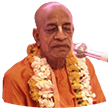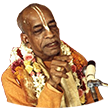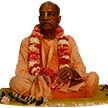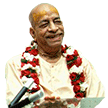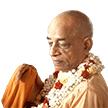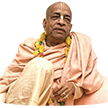Vedic Hymns - an essential subject: Difference between revisions
(Created page with "Category:Essential Subjects <!----------------------- edit below this line -----------------------> <!------------------------ begin introduction text below --------------...") |
(Vanibot #0041: Moves Choose Another box to the end) |
||
| Line 2: | Line 2: | ||
<!----------------------- edit below this line -----------------------> | <!----------------------- edit below this line -----------------------> | ||
<!------------------------ begin introduction text below ------------------------> | <!------------------------ begin introduction text below ------------------------> | ||
The transcendental ecstasy enjoyed by the devotees in delineating the pastimes of the Lord is certainly unknown to nondevotees and mental speculators. Unless one relishes transcendental joy, naturally one will come back from his speculations and concocted conclusions because he will see them as neither factual nor enjoyable. The devotees can at least know that the Absolute Truth is the Supreme Personality of Godhead Viṣṇu, as the Vedic hymns confirm: oṁ tad viṣṇoḥ paramaṁ padaṁ sadā paśyanti sūrayaḥ. | |||
Srila Prabhupada's books, lectures, conversations and letters offer a comprehensive presentation of this essential subject as seen in the Vaniquotes '''[[Vaniquotes:Category:Vedic Hymns|Vedic Hymns]]''' category. An introduction from his books is given below in the following | Srila Prabhupada's books, lectures, conversations and letters offer a comprehensive presentation of this essential subject as seen in the Vaniquotes '''[[Vaniquotes:Category:Vedic Hymns|Vedic Hymns]]''' category. An introduction from his books is given below in the following 8 quotes. | ||
<!-------- end introduction text and don't touch next three lines ---------> | <!-------- end introduction text and don't touch next three lines ---------> | ||
== Quotes from Srila Prabhupada's books == | == Quotes from Srila Prabhupada's books == | ||
<!----------------- edit quote boxes below this line -----------------> | <!----------------- edit quote boxes below this line -----------------> | ||
{{VaniQuotebox| | {{VaniQuotebox|A prostitute has no reputation for good womanly qualities. Similarly, the tongue, which is given to the human being for chanting the Vedic hymns, will be considered a prostitute when engaged in chanting some mundane nonsense|The human tongue is especially given for chanting the Vedic hymns and not for croaking like frogs. The word asatī used in this verse is also significant. Asatī means a woman who has become a prostitute. A prostitute has no reputation for good womanly qualities. Similarly, the tongue, which is given to the human being for chanting the Vedic hymns, will be considered a prostitute when engaged in chanting some mundane nonsense. '''(Śrīmad-Bhāgavatam 2.3.30)'''}} | ||
{{VaniQuotebox| | {{VaniQuotebox|Actually, the explanation of this mantra (Bhagavad-gita 12.5) and of practically all the mantras of the Vedic hymns is summarized in the Vedanta-sutra and properly explained in Srimad-Bhagavatam|Actually, the explanation of this mantra and of practically all the mantras of the Vedic hymns is summarized in the Vedānta-sūtra and properly explained in Śrīmad-Bhāgavatam. Śrīmad-Bhāgavatam is the mature fruit of the Vedic tree of wisdom. In Śrīmad-Bhāgavatam this particular mantra is explained in the questions and answers between Mahārāja Parīkṣit and Śukadeva Gosvāmī at the very beginning of their meeting. Hearing and chanting of the science of God is the basic principle of devotional life. '''(Sri Isopaniṣad, Mantra 17)'''}} | ||
{{VaniQuotebox| | {{VaniQuotebox|After the end of the battle, Krpacarya again became a member of the royal assembly, and he was called during the birth of Maharaja Pariksit for recitation of auspicious Vedic hymns to make the ceremony successful|After the end of the battle, Kṛpācārya again became a member of the royal assembly, and he was called during the birth of Mahārāja Parīkṣit for recitation of auspicious Vedic hymns to make the ceremony successful. Mahārāja Yudhiṣṭhira, while quitting the palace for his great departure to the Himalayas, entrusted Kṛpācārya with Mahārāja Parīkṣit as his disciple, and he left home satisfied because of Kṛpācārya's taking charge of Mahārāja Parīkṣit. '''(Śrīmad-Bhāgavatam 1.12.13)'''}} | ||
{{VaniQuotebox| | {{VaniQuotebox|All the Vedic hymns are chanted to please Lord Krsna. This is confirmed in the Bhagavad-gita|All the Vedic hymns are chanted to please Lord Kṛṣṇa. This is confirmed in the Bhagavad-gītā (15.15). All the Vedas, Upaniṣads, Vedānta, etc., are seeking Him only, and all hymns are for glorifying Him only. The sages, therefore, performed the exact acts suitable for the purpose, and they happily departed for their respective hermitages. '''(Śrīmad-Bhāgavatam 1.9.47)'''}} | ||
{{VaniQuotebox| | {{VaniQuotebox|Comprehending the three kinds of Vedic activity (karma-kanda, jnana-kanda and upasana-kanda), the chandas, or Vedic hymns, and the processes for satisfying the demigods - is included in the eight syllables Hare Krsna, Hare Krsna|The essence of all Vedic knowledge—comprehending the three kinds of Vedic activity (karma-kāṇḍa, jñāna-kāṇḍa and upāsanā-kāṇḍa), the chandas, or Vedic hymns, and the processes for satisfying the demigods—is included in the eight syllables Hare Kṛṣṇa, Hare Kṛṣṇa. This is the reality of all Vedānta. The chanting of the holy name is the only means to cross the ocean of nescience. '''(Caitanya-caritāmṛta, Ādi-līlā 7.76)'''}} | ||
{{VaniQuotebox| | {{VaniQuotebox|Considering that women, sudras and dvija-bandhus (unworthy sons of the twice-born) cannot understand the Vedic hymns directly, Srila Vyasadeva compiled the Mahabharata|The great sages present the Purāṇas in order to make the Vedic mantras understandable for common men (strī-śūdra-dvija-bandhūnām (SB 1.4.25)). Considering that women, śūdras and dvija-bandhus (unworthy sons of the twice-born) cannot understand the Vedic hymns directly, Śrīla Vyāsadeva compiled the Mahābhārata. '''(Caitanya-caritāmṛta, Madhya-līlā 6.147)'''}} | ||
{{VaniQuotebox| | {{VaniQuotebox|Dhanur-veda, or military science, was taught by Dronacarya with all its confidential secrets of throwing and controlling by Vedic hymns|Dhanur-veda, or military science, was taught by Droṇācārya with all its confidential secrets of throwing and controlling by Vedic hymns. Gross military science is dependent on material weapons, but finer than that is the art of throwing the arrows saturated with Vedic hymns, which act more effectively than gross material weapons like machine guns or atomic bombs. The control is by Vedic mantras, or the transcendental science of sound. '''(Śrīmad-Bhāgavatam 1.7.44)'''}} | ||
{{VaniQuotebox| | {{VaniQuotebox|Even in the modern age, tests are executed on animal bodies in the physiology laboratory. Similarly, whether or not the brahmanas were uttering the Vedic hymns correctly was tested by sacrifice in the arena|Even in the modern age, tests are executed on animal bodies in the physiology laboratory. Similarly, whether or not the brāhmaṇas were uttering the Vedic hymns correctly was tested by sacrifice in the arena. On the whole, the animals thus sacrificed were not at all the losers. '''(Śrīmad-Bhāgavatam 4.5.24)'''}} | ||
<!----------------- edit quote boxes above this line -----------------> | <!----------------- edit quote boxes above this line -----------------> | ||
| Line 30: | Line 30: | ||
'''Vedic Hymns - [[Vaniquotes:Category:Vedic Hymns|explore more within this category]]'''. | '''Vedic Hymns - [[Vaniquotes:Category:Vedic Hymns|explore more within this category]]'''. | ||
{{EsentialSubjectTotal}} | {{EsentialSubjectTotal}} | ||
<div style="float:left;"> | |||
{{EssentialSubjectnav}} | |||
</div> | |||
__NOTOC__ | __NOTOC__ | ||
__NOEDITSECTION__ | __NOEDITSECTION__ | ||
Latest revision as of 18:07, 22 November 2020
The transcendental ecstasy enjoyed by the devotees in delineating the pastimes of the Lord is certainly unknown to nondevotees and mental speculators. Unless one relishes transcendental joy, naturally one will come back from his speculations and concocted conclusions because he will see them as neither factual nor enjoyable. The devotees can at least know that the Absolute Truth is the Supreme Personality of Godhead Viṣṇu, as the Vedic hymns confirm: oṁ tad viṣṇoḥ paramaṁ padaṁ sadā paśyanti sūrayaḥ.
Srila Prabhupada's books, lectures, conversations and letters offer a comprehensive presentation of this essential subject as seen in the Vaniquotes Vedic Hymns category. An introduction from his books is given below in the following 8 quotes.
Quotes from Srila Prabhupada's books
Vedic Hymns - explore more within this category.
Vanipedia has now over 903 introductory articles compiled from Srila Prabhupada's books under the series titled Essential Subjects. All these articles can be seen in the Table of Content on the right side of this article and also here in this Umbrella Category. Browse through them to relish the breadth and depth of Srila Prabhupada's teachings - There is a subject for everyone.

